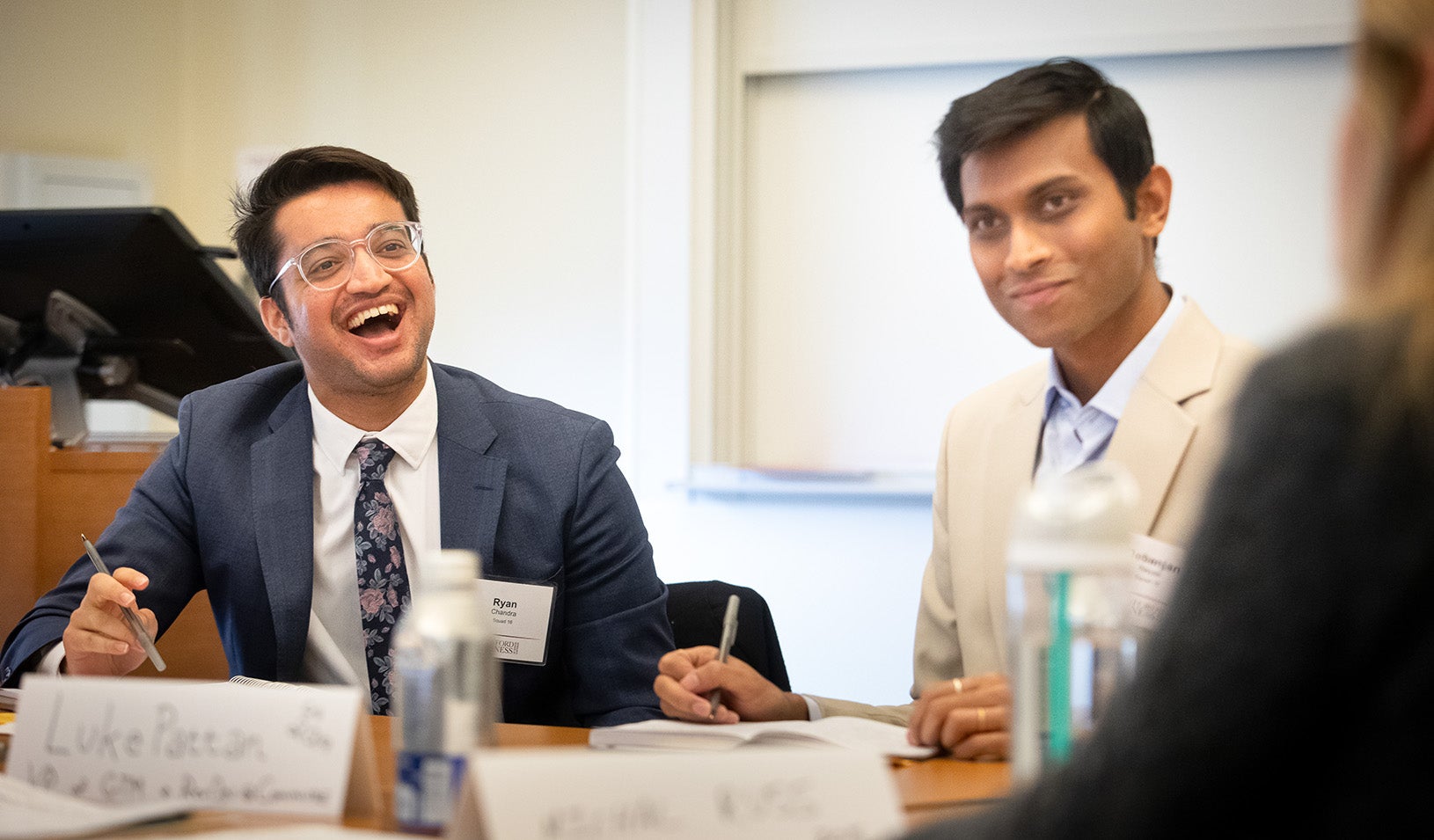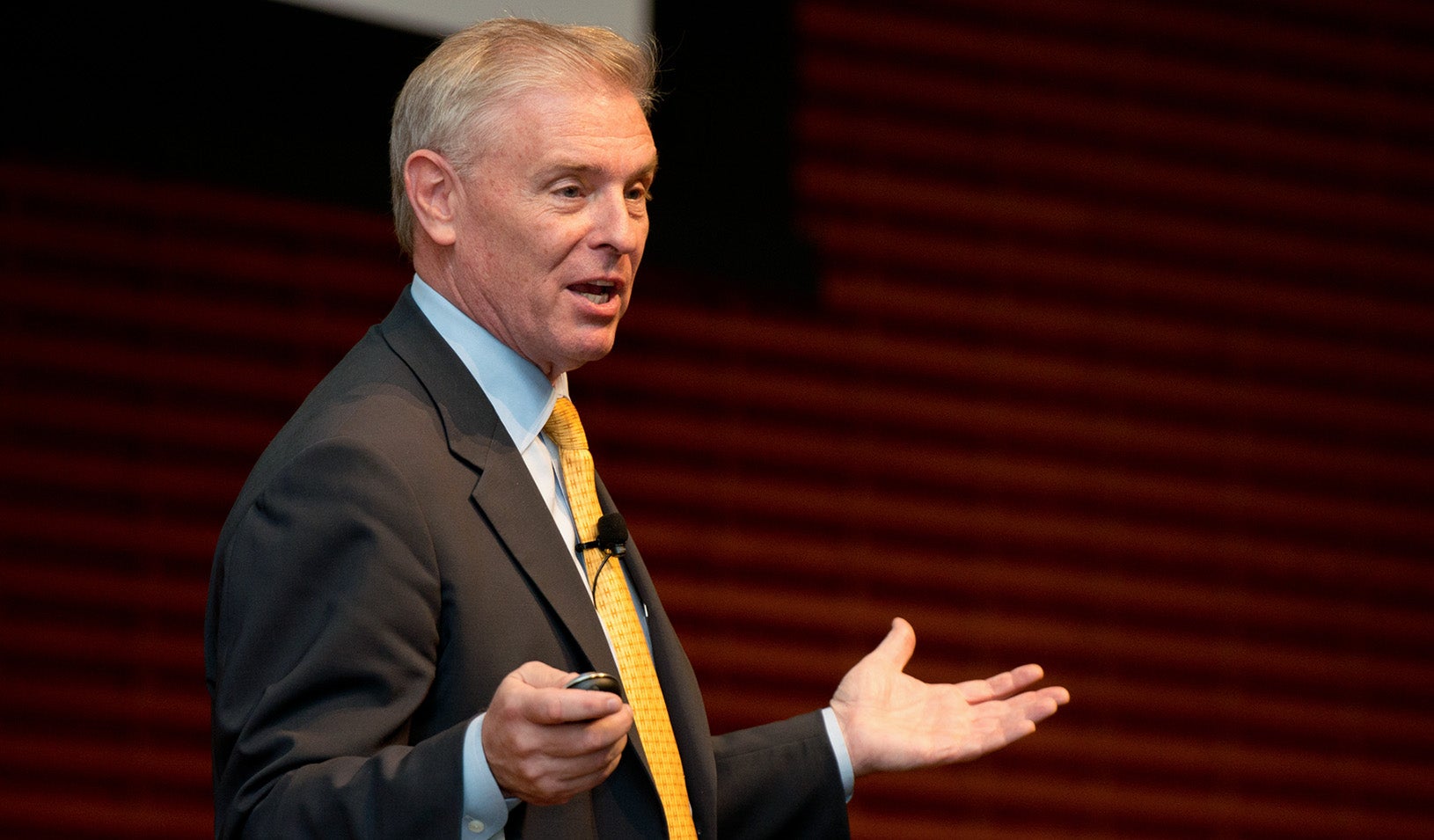June 12, 2010
Dean Saloner, thank you for the warm welcome. Today marks a full turning point for us, Dean. When I was a student here, and I was co-editor of The Reporter, you didn’t answer my calls. Then when I was busy starting eBay, I didn’t answer your calls. Then you became the first holder of the Jeffrey Skoll professorship at Stanford GSB and we started answering each other’s calls. So congratulations on your first year as Dean and, who knows, maybe soon we can even be Facebook friends?
I am deeply honored to be the first Stanford GSB alumnus to address a graduating class. There have been many notable graduates of the school since it was founded in 1925, including Phil Knight, Charles Schwab and Scott McNealy. There are even a couple of Stanford GSB dropouts that you may have heard of, Steve Ballmer and John F. Kennedy. Imagine what they would have done if they had graduated? But you get me today, and I am grateful to be here.
Fifteen years ago, I sat in the same seats that you are sitting in today, both literally and figuratively. It was the first and only time I had been to the Frost Amphitheater until today. I don’t remember a single word that any speaker said. So anything I say here today will likely have a short shelf life.
What I do remember feeling on GSB graduation day is what I imagine you are feeling right now: pride, exhilaration, and gratitude. But remember: none of us made it here entirely on our own. In particular, we had the help and the encouragement of our friends and families. They are the ones bursting with pride right now. So before you hear anything more from me, let’s (again) show them how much they mean to you!
When I was with The Reporter, I wrote a regular opinion column, called Northern Exposure, in homage to my Canadian roots. I recently looked back in my archives and found a letter that I had written to my class, from the year 2010. It went something like this:
Dear Graduating Class of 1995, Greetings from the future! I know you are having fun getting together for FOAM nights, LPF events, playing golf and skiing in Tahoe. Well good news, life will be just like that after you graduate!
Actually, not so much.
You will soon be starting your first job out of school.
You will be so busy after you graduate, that you will look back fondly on all the spare time that you had at the GSB. But don’t worry, by the year 2010, there will be all kinds of new time saving inventions like smart phones and the Internet and social networking and they will save you so much time you will have your life back again.
Actually, not so much.
But there will be some remarkable breakthroughs. In 2010, there will be iPhones, iPods and iPads. There will even be an African-American President from Illinois who will be known by the letter “O”. But she will prefer to be called President Winfrey.
After you get out of school, almost all of you will be successful in business and you will find that hard work and good choices will help you succeed at whatever you put your hand to.
And, unlike the successful business leaders of your parents’ generation, you won’t have to wait until you retire to think about giving back, getting involved in your community or philanthropy. In the year 2010, social entrepreneurs like Paul Farmer and Mohammed Yunus will be admired for their work trying to help the world, just as much as many business entrepreneurs.
Oh, and yes, in 2010, Tiger Woods will still be a great role model.
Actually, not so much.
My Story
Speaking of role models, I’d like to shift gears and tell you about some of the people who influenced me.
When I was growing up, I admired writers whose stories made the world seem a very small and interconnected place, writers like Ayn Rand, George Orwell and Aldous Huxley. My dream was to tell stories that would change the world.
In those days, my family used to go camping in upstate New York. There wasn’t much to do except fight with my sister or read books. So, I opted for the books. By the time I was a teenager, I had read a lot about pollution, nuclear proliferation, and other threats to humankind, and I resolved to try to make the world of the future a better place. I thought I could do that by telling stories that would inspire people to get involved in the issues that affect us all.
Around that time, my father came home one day and announced that he had cancer and that it looked pretty bad. Then he said something that has stuck with me to this day. He said that he wasn’t so much afraid that he might die, but that he hadn’t done the things that he wanted to with his life.
Fortunately, my father is still alive today, but for me that was a wakeup call and it set me on a mission.
I didn’t think that writing stories about issues would be the best way to make a living, so I decided to go down an entrepreneurial path so that I could one day afford to write these stories.
Along the way, I started several companies, including the appropriately named “Micros on the Move,” a computer rental company that didn’t do too well because people kept stealing the computers.
I knew then that I had better go to business school. When I got into Stanford GSB, I was overjoyed, and I set out with an open mind towards new opportunities.
A couple of years later, when my friend Pierre Omidyar approached me with his idea for eBay, I was very sure of what to do. With my newly minted GSB degree in hand, I said “Pierre, what a stupid idea!” Luckily, I soon realized that Pierre was onto something.
For me, being part of the creation of eBay was a fantastic experience and gave me the resources to live my dream on a scale I had never imagined. But, throughout, I knew that telling stories that made a difference was what I most wanted to do.
That dream has now taken form as Participant Media, a company I created six years ago. Since then, we have released 25 films, including An Inconvenient Truth, The Cove, Charlie Wilson’s War, Syriana, The Soloist and The Kite Runner. These films have been nominated for 17 Academy Awards and have won four times.
But for me it is all comes back to changing the world with a story.
What really makes me happy is to know that the film North Country helped ensure the re-authorization of the Violence Against Women Act. An Inconvenient Truth brought conversations about global warming into classrooms, living rooms and boardrooms all over the world. And, The Cove has helped to stop the slaughter of dolphins in Japan.
I’m very fortunate that I have been able to live the dreams that I had as a young teenager, and I am forever grateful to Stanford GSB for its important role in my life along the way.
Finding Your Path
So how does all this apply to you?
Some of you came to business school already sure of your dreams and your ideal path. Others of you are looking for new ideas, new opportunities, and new paths.
Whether or not you have a firm grasp of your future, I have two messages for each new graduate here today.
My first message is to define your dream and chase it with as much rigor and authenticity as you can muster.
Arguably, most all of you are already successful according to conventional definitions, and most all of you will get out of debt quickly, and make plenty of money. But while you’re thinking about making money, make sure you’re also thinking about making meaning. Money without meaning can be an unfulfilling life. All of you entrepreneurial graduates here today absolutely can and should seek both.
One GSB graduate and friend of mine, Jacqueline Novogratz, is a perfect example of what I mean. She had been an investment banker, found her passion as an advocate for the poor, and went on to work at the World Bank. She realized there must be a better way, and with the encouragement of her GSB mentor, John Gardner, she decided to start the Acumen Fund. Her work now affects millions of people in Africa and Asia.
Through the Skoll Foundation, which I created eleven years ago, I work with Jacqueline Novogratz and other leading social entrepreneurs who live their dreams by using their skills to solve the world’s most pressing problems. How will each of you pursue and live your dream?
My second message has to do with the urgency of time.
I recently attended my GSB 15th year reunion and it has left me in a reflective state.
Three of my classmates are no longer with us. I know that you too have lost classmates recently and that they are very much on your mind today.
There are some lessons in this for all of us.
Right now, it may seem as if you have a lot of time to make decisions that may take you on a path different from where you ultimately want to end up, someday.
Maybe you want to be a painter or a singer or an entrepreneur or a social entrepreneur, but that job with a big salary is calling out. You will get to those other things, someday.
For many people, someday will never come. It certainly never came for our classmates who are no longer with us.
So my second message is that time is more precious than money. Every one of you has the capacity to get more money. But none of us can manufacture more time.
As I finish my thoughts today, I’d like to leave you with these words from Eleanor Roosevelt:
The future belongs to those who believe in the beauty of their dreams.
So, my soon-to-be fellow GSB alumni: seek meaning, focus on your dreams and begin to live them today, not someday … If you do that, then the future will be an unquestionably beautiful place.
Thank you and congratulations!
By Jeffrey Skoll, MBA ‘95
For media inquiries, visit the Newsroom.



